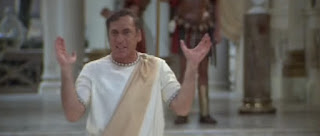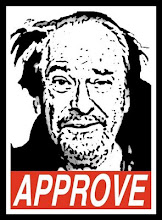That man, of course, was Comicus the stand-up philosopher:
As we face this terrifying future it's only natural that some of us should choose to look backwards instead, as was the case with a reader by the name of Gregory, who tells me he came across this passage recently while reading "All the President's Men:"
"There was a pretty fair bike shop in McLean, and Bernstein drove there to kill a couple of hours and look halfheartedly for a replacement for his beloved Raleigh. [side note: Carl Bernstein's Raleigh was stolen from a DC parking garage the night of the Watergate indictments] But his mind was on Jeb Magruder. He had picked up a profoundly disturbing piece of information that day: Magruder was a bike freak. Bernstein had trouble swallowing the information that a bicycle nut could be a Watergate bugger. And Magruder really was a card-carrying bicycle freak who had even ridden his 10-speed to the White House every day."
Not having read the book (or been born at the time of the Watergate break-in for that matter) I didn't realize that such a strong Fredly narrative thread ran through the story, though I have seen the movie and now that I think of it I do remember that Bernstein (as played by Dustin Hoffman) kept his front wheel at his desk:
Indeed, between the bicycle wheel, the insouciantly floppy middle-parted hairdo, and his semitic nose for both news and justice, Bernstein (as played by Dustin Hoffman) very much informed my childhood image of the urban writer. Certainly carrying your front wheel around seemed to me like a very cosmopolitan thing to do, and it was a notion I kept with me until years later I tried to bring my own front wheel into a Manhattan office building and they refused to let me into the elevator with it.
Anyway, it was certainly a more appealing journalistic image than that of Pete Hamill's loutish brother driving around Queens in his Plymouth Gran Fury and complaining about speed limits:
("Derp derp duy I used to play stickball derp derp derp.")
Putz.
By the way, it would appear that back in the 1970s Dustin Hoffman was also scoring smugness points off the screen, because here he is child-schlepping in Manhattan:
I realize it's typical to be overly nostalgic for the decade for one's birth, but I can't help thinking that during my lifetime we've completely surrendered to the neurotic car-centric illusion of safety, and it's depressing to imagine the media shitstorm that this sort of helmetless celebrity cycling would precipitate today.
Then again for all I know it's just a publicity shot and the guy never schlepped a kid in his life, what the hell do I know?
Nevertheless, you can tell a great deal about a culture by looking at its relationship (or lack thererof) with the bicycle. For example, Americans are selfish, spoiled, SUV-driving consumers. Australians are selfish, spoiled, SUV-driving consumers with funny accents. And so on.
Furthermore, the bicycle can also be a powerful instrument of social change. Consider for example the role it once played in the struggle for women's rights:
The craze was meaningful, especially, for women. Both Susan B. Anthony and Elizabeth Cady Stanton are credited with declaring that "woman is riding to suffrage on the bicycle," a line that was printed and reprinted in newspapers at the turn of the century. The bicycle took "old-fashioned, slow-going notions of the gentler sex," as The Courier (Nebraska) reported in 1895, and replaced them with "some new woman, mounted on her steed of steel." And it gave women a new level of transportation independence that perplexed newspaper columnists across the country.
Not that you'd know it today:
Still, it's both inspiring and humbling to see that the bicycle is still playing this role in other cultures:
Amna Suleiman and her friend Asala taking a break from cycling in the northern Gaza Strip on Friday. They are among the first women in years to pedal publicly in Gaza, where an unwritten rule bars women past puberty from cycling.
Sadly we also have an unwritten rule here in America that you don't ride a bicycle past puberty regardless of gender, but in our case it's not about gender oppression, it's just simple laziness.
And while relatively expensive hybrid bicycles gather dust in suburban garages as we squander our hard-won liberty, cycling in Gaza is an act of defiance:
“The role of our women is to obey their husbands and prepare food for them inside the house, not to imitate men and ride bikes in the streets,” said the man, 33, who refused to give his name but echoed the view of many Gaza men interviewed, and of multiple comments on social networks, after news of the cycling group reached the Palestinian news media.
One can assume that the above-quoted man A) is single; and B) refused to give his name out of fear that his mother would punish him for his impudence by refusing to cook dinner for him.
Of course, while it's important to recognize that our own culture is spoiled and coddled, it's also worth noting that this recognition can collapse under its own weight in a sort of smugness meltdown, as evidenced by the existence of this guy:
See, you're just a stupid consumer, whereas he's a guy with integrity who made money in tech and now lives in the vicinity of Boulder, a place known around the world for being totally down to earth:
Gradually, he divulged more, as he warmed to the persona and to the admiration of the masses. Now his adherents know that he lives in Longmont, Colorado, a half hour northeast of Boulder—a Mustachian paradise. The town was founded by Chicagoans in 1871 as an agricultural utopia, and later thrived on the production of sugar beets. The heart of it is a grid of compact but stately homes with trees on small lots. In the past several years, a tech-based Boulder boom has spread to Longmont, lifting prices and reviving a once moribund downtown. I heard Boulderites refer to it as “Methmont,” but now it’s a craft-brew town, full of gut jobs and fixer-uppers, which Mr. Money Mustache often finds himself working on—for fulfillment, of course, since he doesn’t need money. He gets around town on foot or by bike. He uses his car only when he has to haul a load of more than a hundred pounds. He and his wife burn just two and half tanks of gas a year.
That's still two and a half tanks of gas more than like 50% of New Yorkers.
("Yep.")
He also pays his son to ride his bicycle:
Adeney pays Simon ten cents for every mile he rides on his bicycle. So far, Simon had logged thirteen hundred miles. Simi’s father, to their dismay, also sometimes gives Simon money. Now the boy had seven hundred dollars, which he had deposited in the Bank of Mr. Money Mustache, at an annual interest rate of ten per cent. With regard to college, Adeney said, “I would rather Simon find a way to pay for it himself.”
I get the not paying for college thing, but if he wants to teach his son self-sufficiency then I don't think anything could be more at odds with that lesson than paying him to ride his bicycle. Getting paid to ride a bike is a pipe dream that has derailed countless young lives. How many more people need to be seduced by the sordid worlds of bike messengering and racing before somebody makes some kind of PSA?
You might as well pay your kid to do bong hits.
Anyway, if you're thinking this level of smugness couldn't possibly be homegrown, you're right, because he's Canadian:
He was reared in Caledonia, Ontario, a town of ten thousand about thirty minutes from Hamilton. Adeney remembers a complete absence of foreign automobiles, and no cable TV at home. His mother, Jane, was a schoolteacher and an artist who became a stay-at-home mom. His father, David, worked at an advertising firm that refused to do ads for alcohol or tobacco. “I did not approve of excess,” David told me. David and Jane divorced when Peter was fifteen.
"A complete absence of foreign automobiles?" Is there even such a thing as a Canadian car?
By now you may suspect that this guy is basically the world's most successful stoner, and of course you'd be right:
In the days I spent with him, we went for a few hikes, visited a puzzle factory, ran errands, had meals, hung around the house. “I operate like a stoner, because I kind of am one,” he told me. One evening, he walked down to the marijuana dispensary. “It’s a retirement drug,” he said. He calls his vaporizer pen “my health stick.” He said that thirty dollars of sativa oil lasts him half a year. It was time for a reload.
Sounds like the miracle of Hanukkah, only with THC.















